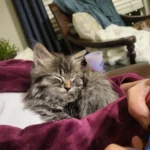Think your cat is happiest when they’re sprawled across your lap while you work? Think again. Cats can actually experience loneliness even when their pet parents are home, especially if they aren’t getting enough attention from their humans. While we often assume our feline friends are content being independent observers, they might actually be silently struggling with isolation right under our noses.
Cats can get depressed, frustrated, and lonely, despite the common myth that they’re purely solitary animals. The truth is, our domestic companions have evolved to form strong bonds with their humans. When those bonds feel strained or neglected, they’ll find creative ways to tell us something’s wrong. Let’s discover the subtle signs that reveal when your cat needs more emotional connection.
Excessive Meowing That Sounds Different

When cats meow constantly with low-pitched sounds that almost sound like they’re in pain, it’s often a form of crying for attention and telling you that they are lonely. This isn’t your typical dinner-time chatter or morning greeting.
Even if your feline is usually a chatterbox, excessive vocalization may be a demand for more attention when they feel lonely or neglected, as adult domestic cats primarily developed meowing to communicate with humans rather than other cats. You’ll likely notice this happening when you leave the house, return after being away, or when you’re trying to sleep.
Destructive Behavior When You’re Present

Lonely cats are bored cats who are masters at finding creative and destructive ways to occupy their minds, moving or destroying things in an attempt to stay busy. Whether they’ve decided to wreak havoc on your sofa or shred your toilet paper, this behavior signals idle paws searching for stimulation.
Your cat isn’t trying to be destructive out of spite – your ripped curtains, scratched doorframes, or shredded couches are actually coping mechanisms for a bored and lonely feline. They’re essentially saying they need more engagement and mental stimulation from you.
Litter Box Issues Without Medical Causes

When cats go to the bathroom outside of the litter box while you’re out of the house, it might be a sign loneliness is creeping in, as cats often exhibit negative feelings like stress or loneliness with destructive behavior. This is commonly reported as a sign of stress and emotional distress in cats.
Cats sometimes stop using their litter boxes when they feel stressed, and stress can be caused by events their owners may not think of as traumatic, including changes in daily routine that can make cats feel anxious. One of the major signs of separation anxiety is cats peeing on their owner’s bed.
Excessive Grooming Leading to Bald Spots

Lonely cats frequently pull out their fur or groom themselves excessively, and while cats are naturally meticulous groomers, obsessive compulsive grooming behavior may be a sign they’re feeling lonely. This goes far beyond normal maintenance grooming.
If your cat produces excessive hairballs or has visible bald spots from over-grooming, it can be related to stress, especially if you’re gone for long hours during the day, as some cats will over-groom whenever they experience physical or mental stress. This behavior serves as a self-soothing mechanism when they feel isolated.
Following You Around Constantly

While cats can be indifferent at times, if you notice your cat will not leave your side and is constantly sleeping on you or sitting on your lap, this could be a sign that they are lonely. This clingy behavior is different from normal affection.
Cat behavior caused by loneliness isn’t always negative – sometimes your cat becomes extra affectionate and may even show signs of separation anxiety, such as trying to follow you out the door or sprawling across your keyboard while you work from home. Even though you’re physically present, they’re telling you they’re not getting the attention they need.
Sleeping More Than Usual

While it’s normal for cats to doze throughout the day, just like humans, boredom can spark the blues in cats and lead to more naps, so if you notice your cat sleeping more than usual or reducing their level of engagement during play time, it could be a sign of loneliness.
If you notice that your cat sleeps longer than what is considered normal, they might be feeling depressed. Boredom can also cause your usually active kitty to become withdrawn or sluggish, as without you there engaging with them, your home isn’t very exciting to your cat.
Changes in Eating Patterns

If you notice your cat does not eat as much as they usually do or that they’re always asking for more food, this might be a sign that your cat is trying to tell you it is feeling sad. These appetite changes often correlate with emotional distress.
Some signs of loneliness may include changes in eating habits, along with depression and lack of interaction with family, as chronic stress signs could include a change in appetite among other behavioral shifts. Food becomes either a comfort mechanism or loses its appeal entirely when cats feel emotionally disconnected.
Aggressive Behavior When You’re Leaving

Lonely cats sometimes act out when they know their person is getting ready to leave, and if your cat becomes aggressive or hostile when you’re on your way out, they’re not trying to get rid of you – they’re telling you they want more time with you.
Your cat may be lonely if they have suddenly taken to swatting or nipping at you as you’re preparing to leave your home, as bored, lonesome cats will engage in stalking, pouncing and human attacks if they’re overlooked or lack regular playtime. This aggressive behavior is actually a desperate plea for connection.
Attention-Seeking Behaviors That Seem Excessive

Attention-seeking behaviors may include excessive vocalization, destructive scratching, pawing or tapping, and deliberately knocking items off surfaces within your view, as cats seek attention for many reasons, including loneliness and boredom. These behaviors escalate when their emotional needs aren’t being met.
Attention-seeking behavior occurs most often in cats who don’t receive adequate stimulation or who are left alone for longer periods, and in general, a cat trying to get your attention will resort to whatever works. When normal requests for attention go unnoticed, they’ll become increasingly creative and persistent in their methods.
Conclusion

Recognizing these signs of feline loneliness is the first step toward building a stronger emotional connection with your cat. Cats are always happiest when their pet parents are at home, and spending quality time each day really engaging with your feline friend through play, grooming, and affection can make all the difference in their emotional well-being.
Remember, lonely cats aren’t just bored cats – they’re cats whose social and emotional needs aren’t being fully met. By paying attention to these subtle signals and responding with consistent, quality interaction, you can help your feline friend feel more secure and content, even when daily life gets hectic.
What signs have you noticed in your own cat’s behavior? Tell us in the comments how you’ve helped your feline friend feel less lonely.






